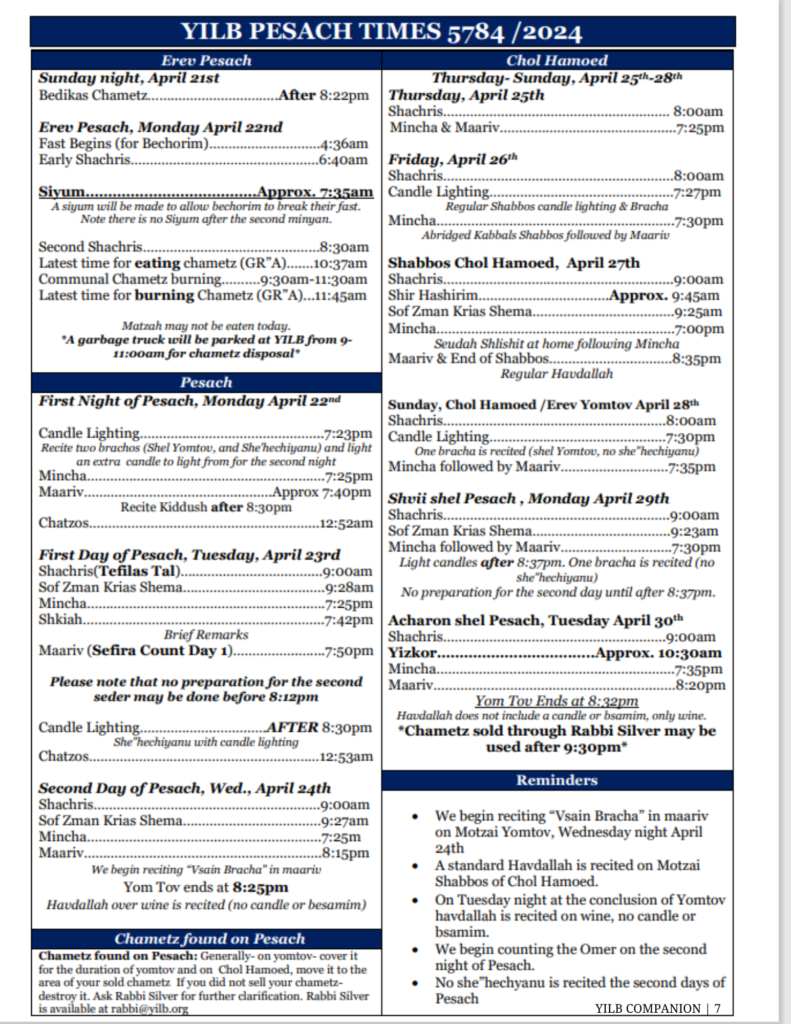


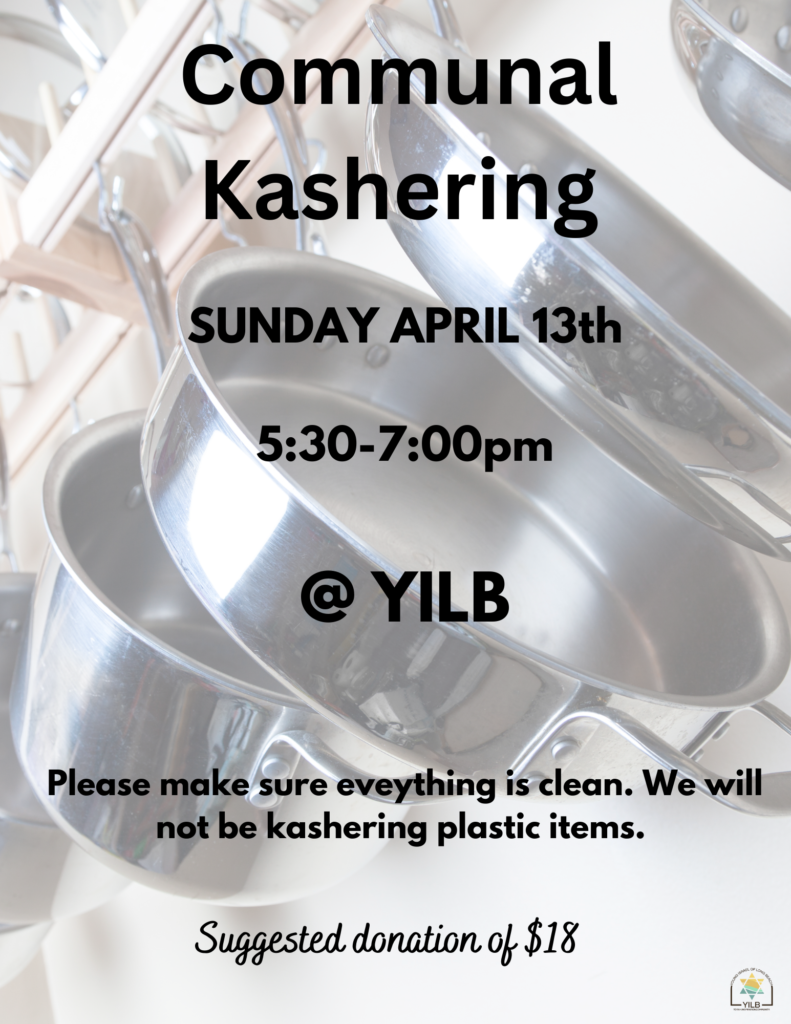

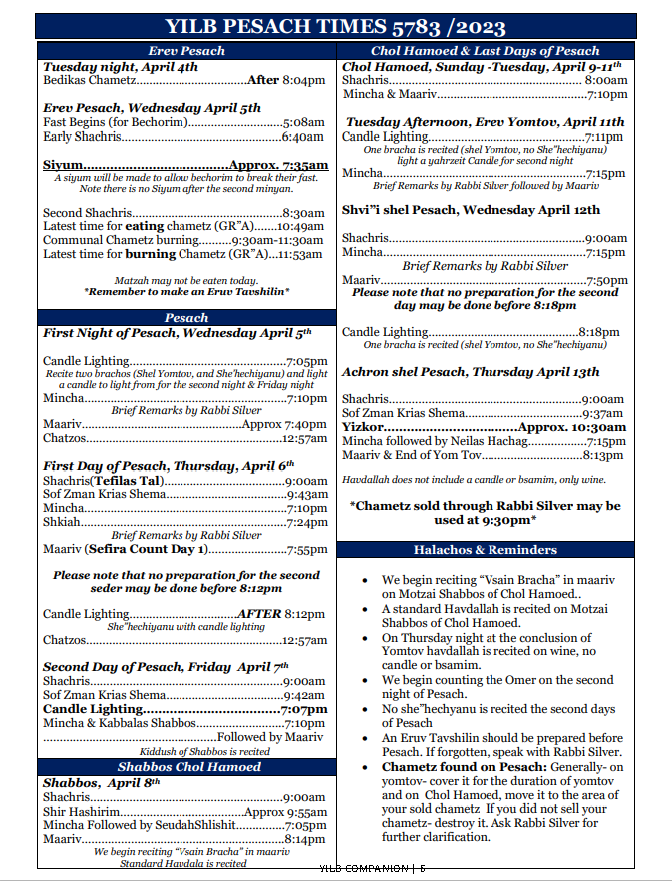
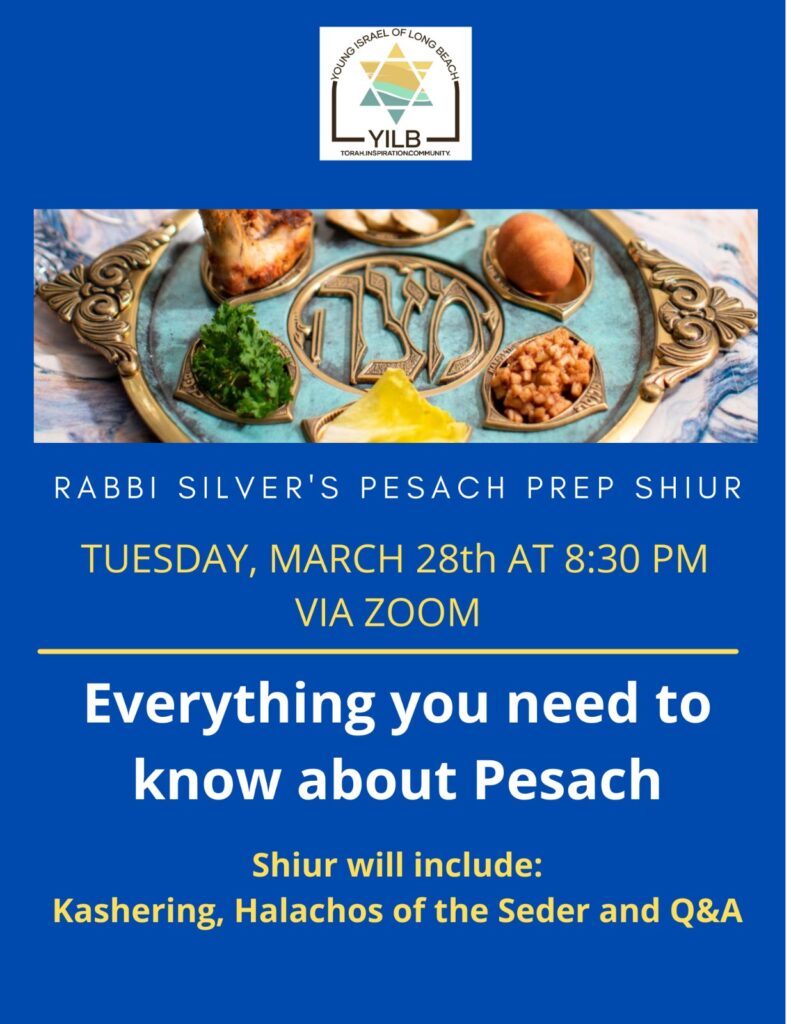
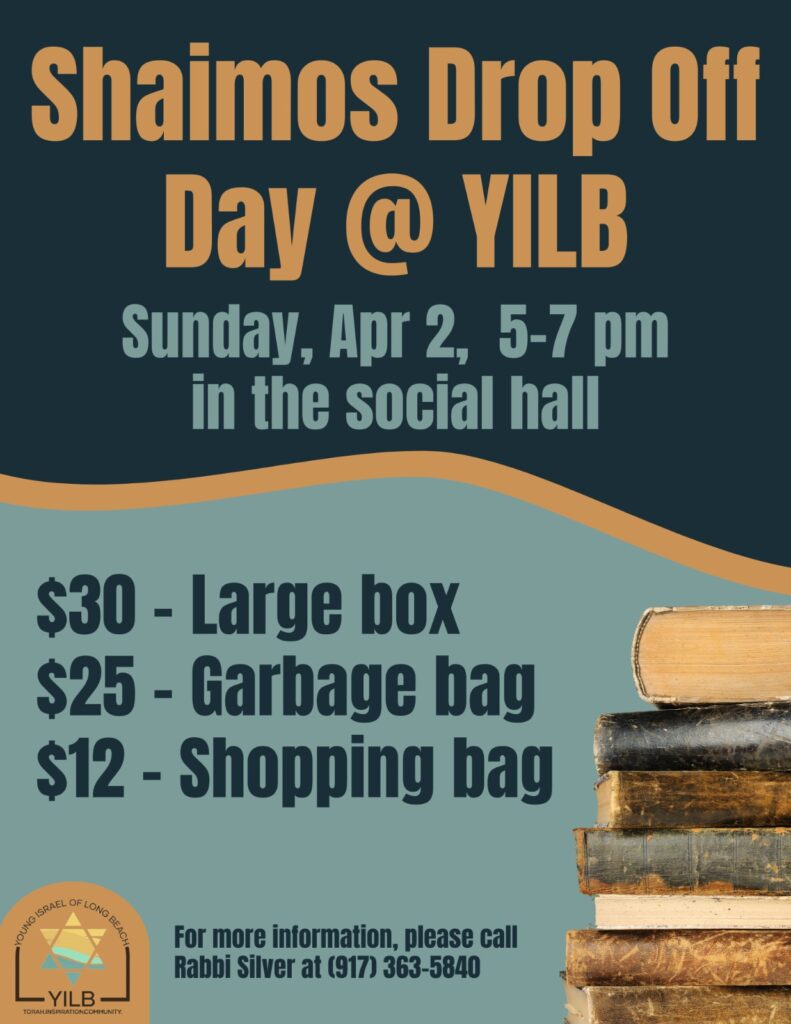
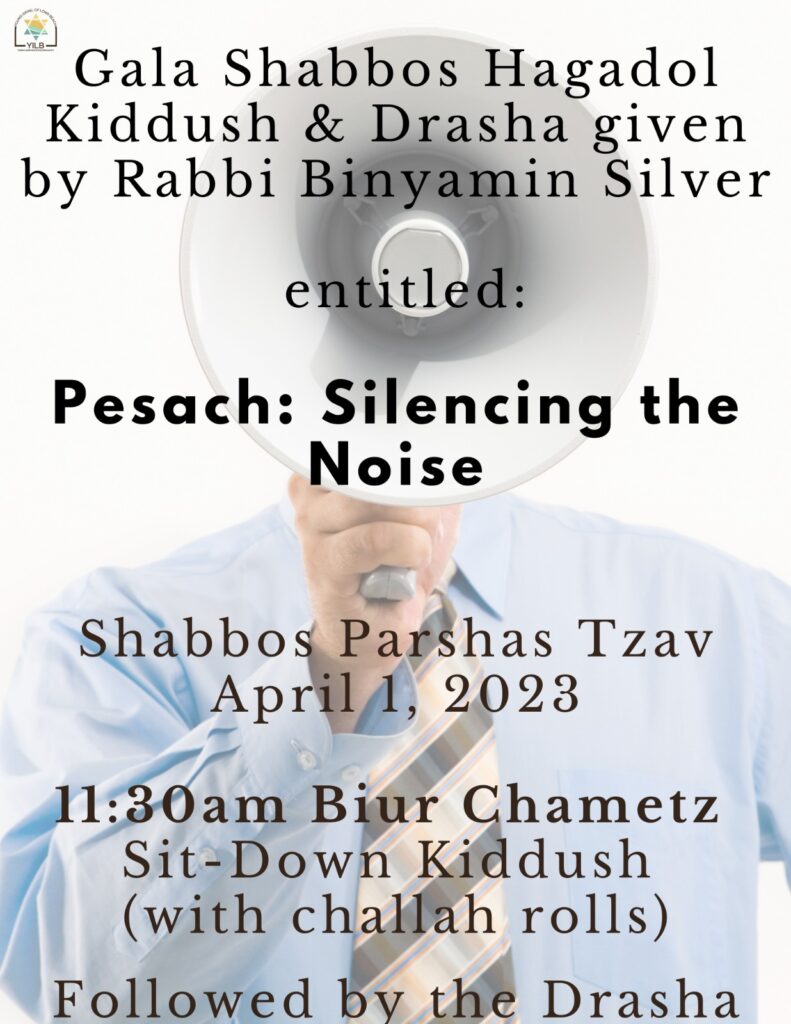
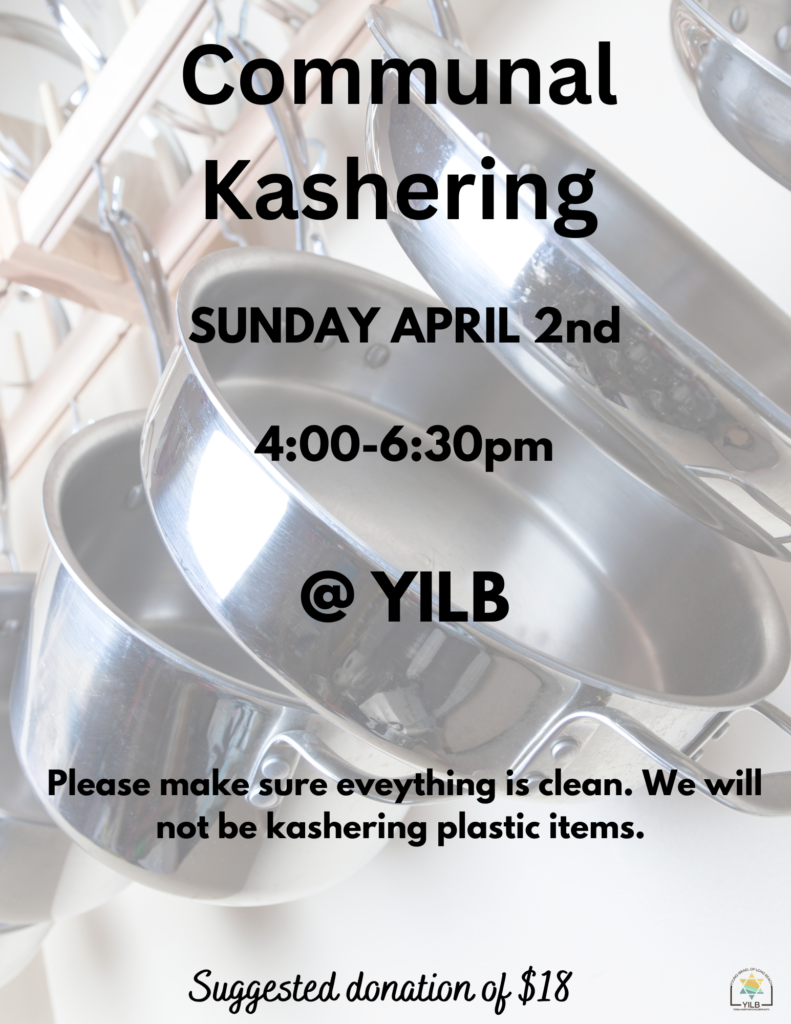
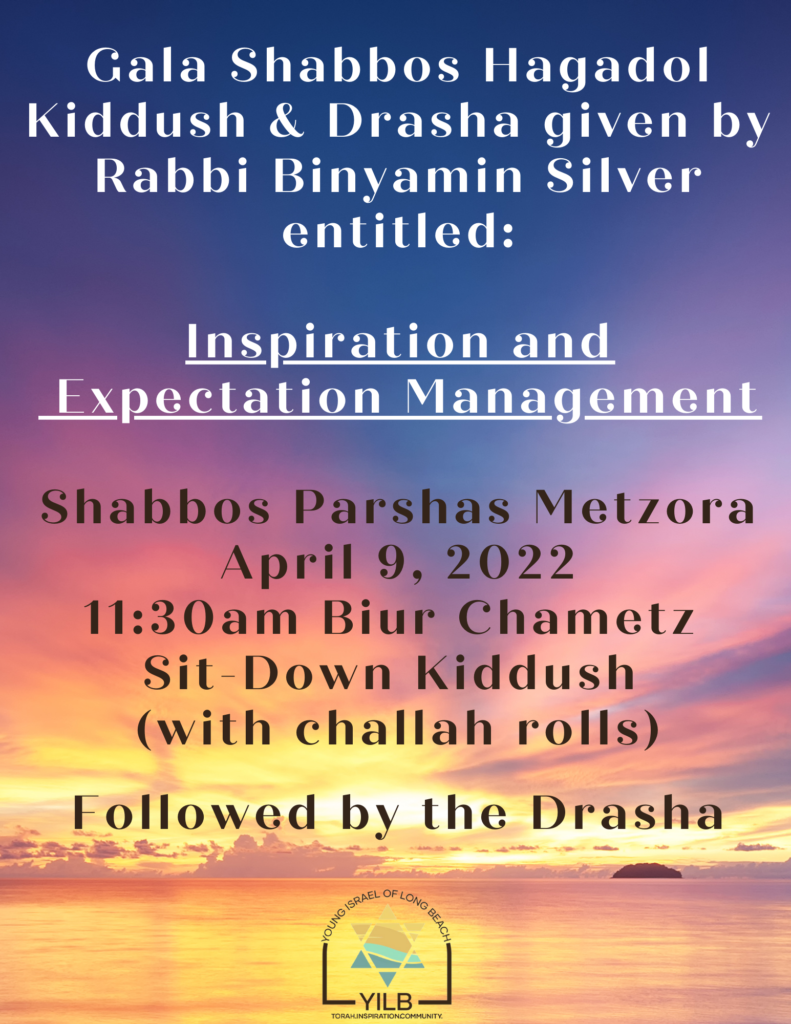
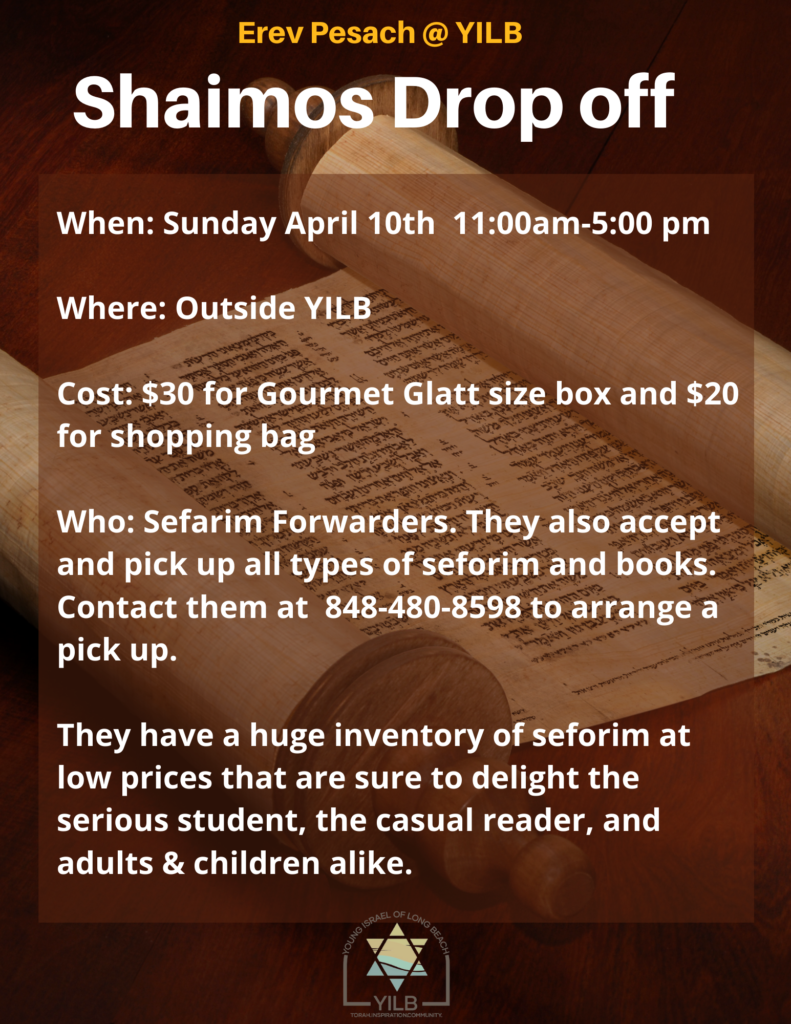
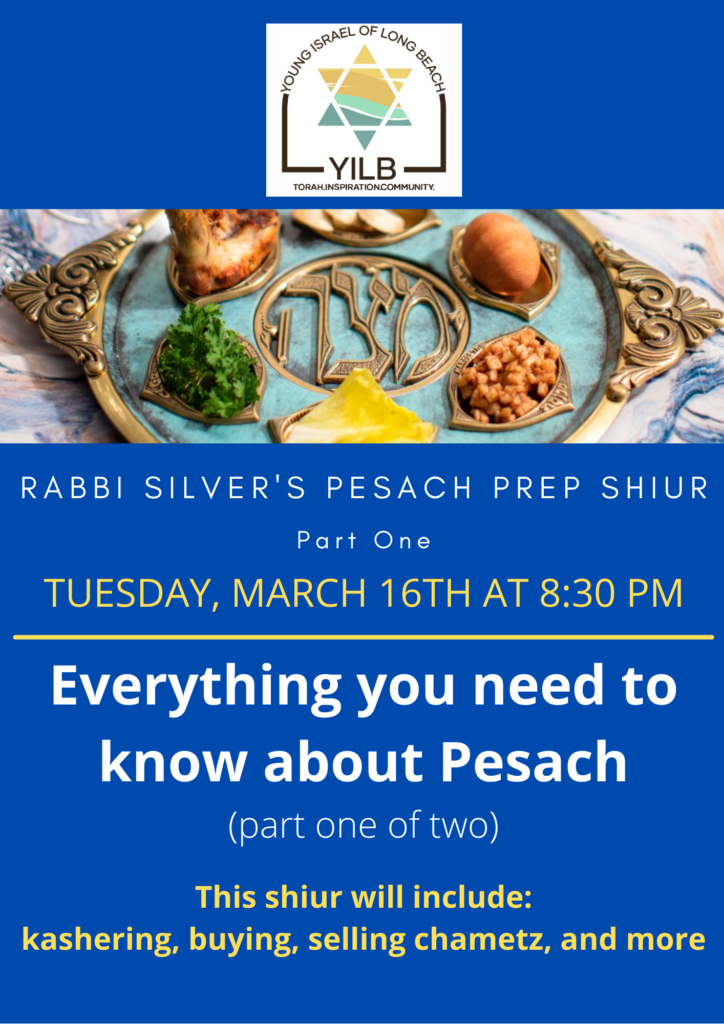
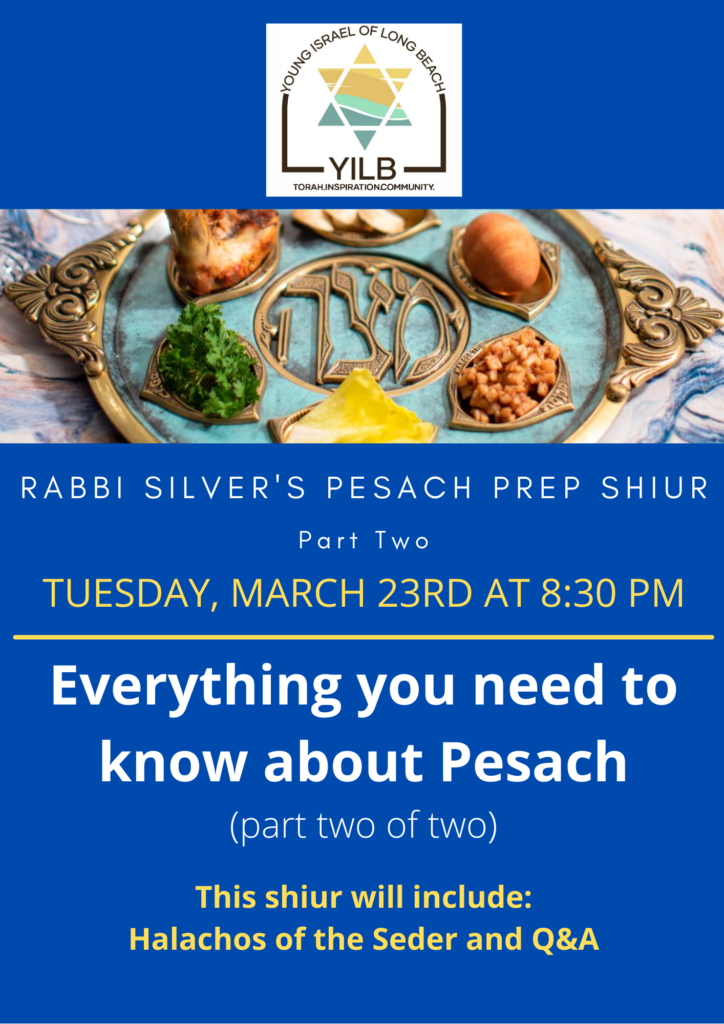



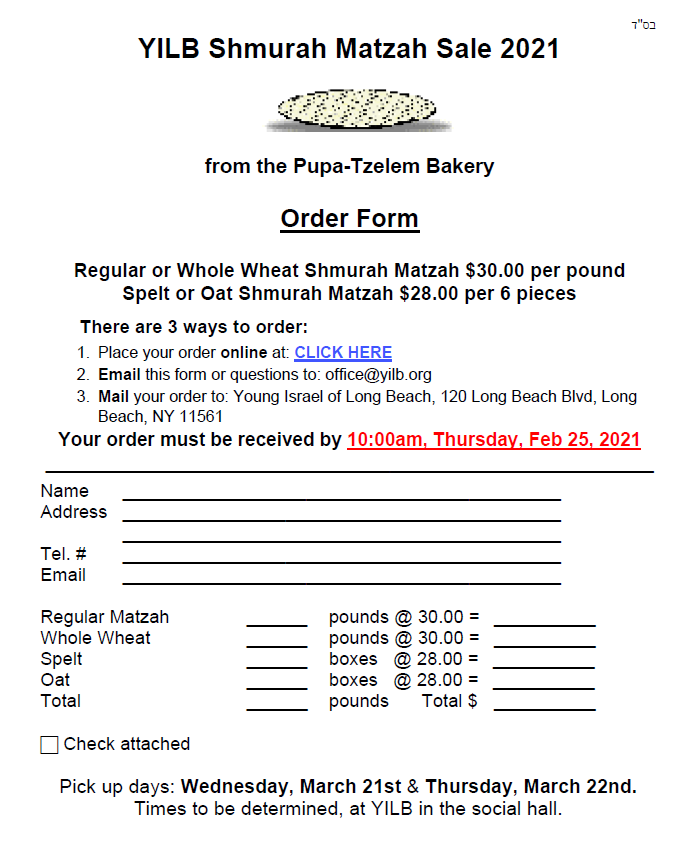
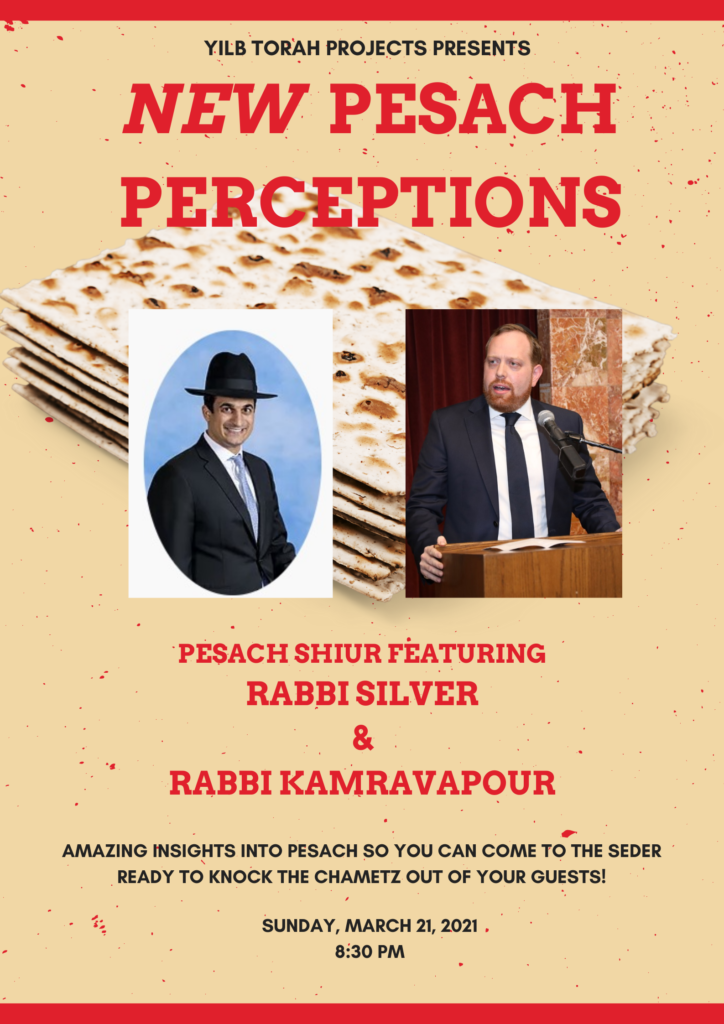
Dear Friends-
It is hard to believe that Pesach is around the corner! As Erev Pesach falls on Shabbos this year, we do many things differently. Below, in calendar form, I have provided some halachik guidance that will be useful in assisting with your pesach plans. Please look out for additional halachik guidance that will be forthcoming over the next days and weeks, and as always, feel free to contact me with any questions.
Happy cleaning!
Thursday morning, March 25 – Ta’anis Bechoros (Fast of the First Born):
This fast is typically observed on Erev Pesach. Because Erev Pesach falls on Shabbos this year, the fast is pushed back to the preceding Thursday. If one attends a siyum on this day, one is exempt from fasting the rest of the day. We are planning to have one siyum in between our two shachris minyanim at approximately 7:35am with a Zoom option for those unable to attend in person. It is preferable to attend a siyum in person, but if that is difficult one may attend via Zoom.
Thursday night, March 25 – Bedikas Chametz (Search for Chametz):
Although the search for chametz is typically performed the night preceding the first night of Pesach (seder night) , we do not do perform the search on shabbos. Therefore, similar to Ta’anis Bechoros, the search is done on Thursday night, at approximately 8:00 pm. As in other years, the standard brachah before the search and the bitul (nullification of the chametz) afterwards are recited.
Friday morning, March 26- Biur Chametz (Destruction of the Chametz):
Typically, biur chametz is performed on Erev Pesach, however, since erev pesach fall out on Shabbos this year, biur chametz must be performed on the preceding day. If it is not feasible for you to burn the chametz, you may break it into small pieces and flush them down the toilet. The chametz should be burned no later than 11:58 am. THE STANDARD BITUL IS NOT RECITED ON FRIDAY MORNING, as one may still eat and own chametz until Shabbos morning. Chametz that you plan to use over Shabbos (morning) or sell to a non-Jew does not need to be destroyed.
Friday morning, March 26 – Mechiras Chametz (Sale of the Chametz):
Any chametz which you will not be destroying on Friday morning and do not plan to use over Shabbos should be set aside in designated locations to be sold to a non-Jew. Please see the email that contains all of the information regarding the sale of chametz and includes an online option to designate Rabbi Silver to sell your chametz on your behalf available HERE. Those selling their chametz through Rabbi Silver should plan to have their chametz put away by 11:55 am.
Shabbos morning, March 27 – Latest Time for Eating Chametz is 10:55 am; Disposal of Remaining Chametz (“Burning”) by 11:58 am:
Ideally one should eat all of the chametz remaining in the home that was not included in the sale. As one may not eat regular matzah today until the seder, one should make the Hamotzi for Shabbos lunch on chametz or egg matzah. As a general rule, Ashkenazim should refrain from eating egg matzah from 10:55 am on, just as they would for chametz. One should complete eating the chametz and, if Ashkenazi, egg matzah, by 10:55 am. In order to accommodate for this early morning seudah we will daven shachris early on this Shabbos.
As previously mentioned, the goal should be that all chametz remaining in one’s home after the burning midday on Friday should either have been eaten by 10:55 am Shabbos morning or have been set aside on Friday to be included in the sale of chametz to the non- Jew. Any remaining crumbs of chametz should be gathered and flushed down the toilet. If one has a significant amount of remaining chametz, it should be given to a non-Jew who will take it away and do with it as he/she pleases. Once the remaining chametz has been addressed, one should recite the bitul which is normally said when the chametz has been burned. All of this should take place before 11:58 am.
Shabbos afternoon, March 27 – Seudah Shlishis (The Third Meal):
As with every Shabbos, there is a mitzvah to eat a third meal this Shabbos. As noted above, we are prohibited from eating food for which we would make Hamotzi (with the exception of Sephardim with egg matzah, as mentioned earlier) after 10:55 am. There are different possibilities for the third meal, including completing it before 10:55 am (one would need to create a sufficient gap between bensching of the first meal and washing for the second meal). A common approach is to have non-hamotzi foods for the third meal, such as meat, chicken, fish, or fruit.
-Rabbi Silver
Question 1: When do we burn our Chametz?
Ordinarily:
We burn our Chametz on the day before Pesach, before the sixth daylight hour.
This year’s problem:
We cannot burn Chametz on Shabbos.
Technically, one may destroy Chametz by other means, even on Shabbos, but there is a need to preserve the practice of burning Chametz.
The solution:
To preserve the practice of destroying Chametz in the way we normally do it every year, we burn our Chametz on Friday, March 26th, before 11:58 am. We will be having a chametz burning from 10:00-11:30 and chametz dumpster at YILB.
Those who will eat Chametz on Shabbos might need to also destroy on Shabbos in a different manner (See below) but everyone must do it with burning on Friday.
Question 2: When do we recite “Kol Chamira” annulling our ownership of Chametz?
Ordinarily:
In an ordinary year, we recite one version of the “Kol Chamira” paragraph after searching for Chametz at night, and a second version when burning the Chametz on the next morning. (Both versions may be found in the Artscroll Siddur p.654) The language we use at night allows us to save some Chametz to use at breakfast. The language we use when we burn the Chametz states that we annul our ownership of all Chametz.
This year’s problem:
We cannot recite the second version of “Kol Chamira” when burning our Chametz, because we are keeping some Chametz for use on Shabbos.
The solution:
We DO recite “Kol Chamira” Thursday night after the Search for Chametz as we normally would. We do NOT recite the second “Kol Chamira” when burning our Chametz. Instead, we recite the second one on Shabbos morning, before 11582 am, after having disposed of any Chametz we may still have.
Question 3: When is our Chametz sold by the Rabbi?
Ordinarily:
Chametz is sold by the rabbi with a sale which takes effect on the morning before Pesach.
This year’s problem:
We cannot sell our Chametz in the normal manner, since we don’t arrange sales on Shabbos.
If we were to sell our Chametz on Friday, we would run into a different problem-if we were to then eat Chametz on Shabbos, we would not be able to add Chametz and utensils to the area containing the already-sold Chametz.
The solution:
Although there are differing approaches to resolve this question, I will be selling the Chametz on Friday and the sale will take effect on Friday. The sale will exclude any Chametz you are keeping to be used for Shabbos meals. Because of the nature of this sale you must remember a few things:
1) If you are keeping rolls for Shabbos meals, you must pre-designate them and set them aside (you can even make a bag or box that says “Shabbos Rolls” and put them in there) already as of Friday morning.
2) This means that as of Friday at 11:58 am you should not use any of your other Chametz that you sold with me since it belongs to the non-Jew (i.e. aside from the Chametz you set aside and designated for Shabbos use).
3) Additionally, it means that if on Shabbos you don’t finish the Chametz you left aside, you cannot simply add it to the stash of Chametz you sold since the sale already took effect Friday morning and therefore nothing else can be included in the sale afterwards. You must dispose of it.
Question 4: What food items should be served at Shabbos Meals this year?
In order to avoid any possible problems, all Chametz products and utensils should be put away by the time the Chametz is burned on Friday. These meals should be 100% kosher for Pesach and prepared using Pesach utensils. Although the meals are kosher for Pesach, since this Shabbos is also Erev Pesach, no Matzah products should be served at the Shabbos meals since it is prohibited to eat Matza on Erev Pesach so that we eat the Matzot at the Seder with excitement. (One may eat products cooked with Matza Meal like Kneidlach or Gefilte Fish and the like – just not baked.)
Question 5: If one cannot serve Chametz or Matzah at the Fri Night and Shabbos Morning meals, what should be used for Hamotzi
Use small fresh soft Challah rolls (to produce as few crumbs as possible), that can be consumed without leaving anything left-over. Prepare just enough for
each person at the meal and no more. Eat the rolls carefully over tissues / napkins / plastic, so that any remaining crumbs can be collected and flushed down the toilet. It is permissible to make Kiddush and Hamotzi and eat the rolls in one location (e.g. outside/front steps) and then return to the table for the rest of the meal as long as you return to say Birkat HaMazon in the place you ate the bread.
❖ You MUST finish eating the bread by 10:55 am (you may continue the rest of the meal of Pesach food this time but the bread/Chametz portion must be done).
❖ Whatever bread or crumbs are left MUST taken care of by 11:58 am.
➢ The “Kol Chamira” must be recited after you finish eating and before 11:42 am.
Davening at Young Israel on Shabbos morning will be earlier than usual (7:30am) to make sure everyone has enough time to finish eating their rolls before 10:55am.
Question 6: What do we do with Chametz which remains after the Shabbos Meal?
The Chametz which remains may be disposed of in one of four ways, before 11:55 am:
1. Allow someone who is not Jewish to remove it for himself
2. Flush very small quantities down the toilet. (Some avoid this, because it is degrading to food.)
3. Douse it with bleach or caustic cleaner and dispose of it in a trash can or bag, declaring the can or bag “ownerless,” and leaving it outside the property, and avoiding it during Pesach.
We wash out our mouths and dental apparatus in the same way we do every year, but we use only liquid toothpaste because of Shabbos. One whose gums bleed when flossed should not use dental floss.
We then recite the “Kol Chamira” paragraph, as explained above.
Question 7: How do we eat Seudah Shlishit?
The problem:
We face competing mandates governing our Shabbos meals:
A. On the one hand, many authorities rule that the third meal of Shabbos must be bread-based, like the first two meals.
B. On the other hand, the third meal is ideally eaten on Shabbos afternoon, at which time Chametz is forbidden, Matzah is forbidden, and Egg Matzah is to be avoided!
The Solution:
The Rema suggests that in a year like this, one should eat Seudah Shlishit after 1:27 pm (ideally after davening Mincha itself) and simply eat matzah balls, meat, fish or fruit. It is important to be careful not to eat this third meal after approximately 4:20 pm so as not to diminish one’s Seder appetite.
Since this does not satisfy the view that the third meal must be bread-based, there are those who in addition to eating the afternoon fruits
or fish or meat also try to get in a second morning bread or Egg matzah meal. To do this they split their morning meal into two parts by stopping midway, reciting the “Birkat HaMazon,” taking a short break, and then washing over rolls again (no kiddush). Of course, this solution will not satisfy the view that the third meal should be after midday.
Question 8: May we make any preparations on Shabbos for the Seder?
One may not prepare on Shabbos for events occurring after Shabbos. One should try to start the seder as soon after Shabbos as possible. In order to facilitate that and in order to avoid various extra melachos on Yom Tov, one should grind the horseradish, wash and check the lettuce for bugs, roast the Shank Bone, grind ingredients for Charoses, mix the salt water etc… all on Friday. One may not make any preparations for the seder on Shabbos even if they don’t involve melacha (like setting the table).
Use the Shabbos to rest – it will be a late night. Remember that no Seder or Yom Tov preparation may be made until 8:02 pm. While it is permitted to rest on Shabbos in order to have energy for the Seder, out of respect for Shabbos we do not say so explicitly.
After Shabbos is over (8:02 pm), one may start preparing for the Seder. Before beginning the preparations, one who did not recite Maariv with VaTodieynu should say this abbreviated version of Havdalah, in Hebrew or English: “Baruch HaMavdil Bein Kodesh leKodesh” “Blessed is the One who distinguishes between one type of sanctity and another”. The full Havdalah is recited during Kiddush at the Seder.
Question 9: How does one light candles for Pesach night?
One must light a 48-hr candle on Friday afternoon. We wait to light Yom Tov candles on the first night of Pesach until Shabbos is over (8:02pm) and light them from that pre-existing flame. We also light candles on the second night of Yom Tov (Sunday night), after the first day of Pesach has ended, from an existing flame.
Question 10: How does one make Havdalah on Pesach night?
Havdalah Saturday night is recited as part of Kiddush at the Seder, before the “Shehechiyanu” blessing. The Yom Tov candles are used for the Havdalah candle. Some people remove two Yom Tov candles from the candlesticks and place them side-by-side, to simulate a multi-wicked Havdalah candle. Others simply leave the candles in the candlesticks. People should follow their normal custom.
A Final Thought- Using a challenge to our advantage.
The Magen Avraham (444:2) records the practice of Rabbi Shimon bar Yochai, who learned Torah in lieu of eating seudah shlishit when erev Pesach fell out on Shabbos. This adjustment to the unique circumstance of this shabbos reflects the opportunity to transform what is normally a hectic day into a day of spiritual preparation for the
seder. The fact that we are not allowed to prepare on Shabbos for the seder, usher us into Pesach with a completely different mind frame. Instead of last minute shopping and preparing, we can spend our day with family, studying Torah and reflecting on the theme of Pesach and the seder.